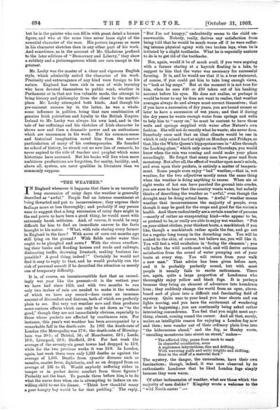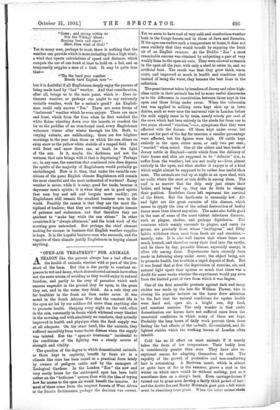"THE WEATHER."
IN England whenever it happens that there is an unusually long succession of rainy days the weather is generally described as "awful." People feel an intense resentment at being thwarted and put to inconvenience ; they express their feelings more or less thoroughly; and probably if any person were to suggest that a long succession of rainy days might in the end prove to have been a good thing, he would meet with extremely harsh criticism. And, of course, it would be very difficult for him to find an immediate answer to the facts brought to his notice. "What, with ruin staring every farmer in England in the face ? With acres of corn cut months ago still lying on the ground ? With fields under water that ought to be ploughed and sown ? With the rivers overflow- ing their banks and flooding houses and roads and railways, dislocating traffic, drowning livestock, making business im- possible ? A good thing, indeed !" Certainly he would not find it easy to reply to that, and he would probably run the risk of personal assault if he described the situation as merely one of temporary difficulty.
It is, of course, an incontrovertible fact that an exceed- ingly wet year like the present—it is the wettest year we have had since 1824, and with two months to run only two inches of rain are needed to make it the wettest of which we have any record—does cause an immense amount of discomfort and distress, both of which are perfectly plain to see. But very wet weather now and then produces some curious effects which can only be set down as "to the good," though they are not immediately obvious, especially to those whose pockets are affected by continuous rain. For instance, this year's wet weather has been accompanied by a remarkable fall in the death-rate. In 1901 the death-rate of London (the Metropolis) was 17.6; the death-rate of Birming- ham was 20.5 ; of Bristol, 16; of Manchester, 22.1; Leeds, 19.3; Liverpool, 22.3; Sheffield, 20-4. For last week the average of the seventy-six great towns had dropped to 15.9, while for the two previous weeks it was 15-8. In London, again, last week there were only 1,333 deaths as against the average of 1,505. Deaths from zymotic diseases such as measles, scarlet fever, diphtheria, and so on dropped from an average of 133 to 61. Would anybody suffering either in temper or in pocket derive comfort from those figures ? Probably not the least. To parade them before him, is to do what the nurse does when she is attempting to induce an un- willing child to eat his dinner. " Think how thankful many
a poor hungry boy would be for that pudding." The reply, "wild North-easter " " But I'm not hungry," undoubtedly seems to the child un- answerable. Nobody, really, derives any satisfaction from being told that he would be much worse off if he were suffer- ing intense physical agony with two broken legs, when he is irritated by a alight toothache. What he is especially anxious to do is to get rid of the toothache.
Nor, again, would it be of much avail, if you were arguing with a farmer staring at a hayrick floating in a lake, to suggest to him that the water was necessary for successful farming. It is, and he would see that it is, a true statement, of course, if you could get him to take long enough views, to " look at big maps." But at the moment it is not true for him, when he sees 240 or 250 taken out of his banking account before his eyes. He does not realise, or perhaps it would be truer to say he does not want to realise, that weather averages always do and always must correct themselves ; that if you have a succession of dry years, you are bound sooner or later to have a succession of wet years ; and that if during the dry years he wants enough water from springs and wells to help him to " carry on," he must be content to have those wells and springs supplied with water after Nature's own fashion. She will not do exactly what he wants; she never does. Somebody once said that an ideal climate would be one in which it only rained hard at night on Mondays and Fridays, so that, like the White Queen's hippopotamuses in "Alice through the Looking-glass," which only came on Thursdays, you would know when the rain was coming and could make your plans accordingly. He forgot that many men have gone mad from monotony. But after all, the effect of weather upon men's minds, and even upon their pockets, is entirely a matter of tempera- ment. Some people even enjoy "bad" weather,—that is, wet weather, for the two adjectives mostly mean the same thing when the weather is doing anything to excess. When six or eight weeks of hot sun have parched the ground into cracks, you are sure to hear that the country wants water, but nobody thinks of describing the weather as " awful," even though the drought may be doing actual harm. "Awful" weather means weather that inconveniences the majority of people, even though it may be good for the crops and good for the nation's health. And there undoubtedly are a certain number of persons —mostly of rather an exasperating kind—who appear to be, or pretend to be, or really are able to enjoy wet weather. " Put on your oldest clothes, your thickest boots, a mackintosh if you like, though a mackintosh rather spoils the fun, and go out for a regular long tramp in the drenching rain. You will be soaked to the skin, of course, but believe me, you will like it. You will feel a wild exultation in facing the elements' ; you will buffet the wild north-east wind, and will derive extreme satisfaction from the sound of water pumping out of your boots at every step. You will return from your walk a new man " That advice has been given before now, and it is probably perfectly sound, but with most people it usually fails to excite enthusiasm. There are, again, quite a large proportion of Londoners who thoroughly enjoy yellow and black fogs. It is perhaps because they bring an element of adventure into humdrum lives ; they suddenly change the world from an open, above- board sort of place into a difficult and fascinating field of mystery. Quite near to your head you hear shouts and see lights moving, and you have the excitement of wondering what is happening ; you are continually being asked rather interesting conundrums. You feel that you might meet any- thing, almost, coming round the corner. And all that, surely, makes an intelligible reason for enjoying a London fog now and then; men wander out of their ordinary plain lives into "the hideousness ahead," and the fog, as Henley wrote, " uncoiling monstrous into street on street," makes-
" The afflicted City, prone from mark to mark
In shameful occultation, seem A nightmare labyrinthine, dim and drifting, With wavering gulfs and antic heights and shifting,
Rent in the stuff of a material dark."
The mystery, the danger, the unusualness, have their own fascinations ; though, indeed, it was once observed by an enthusiastic Londoner that he liked London fogs simply because they were warm.
Of other inclemencies of weather, what are those which the majority of men dislike ? Kingsley wrote a welcome to the
" Come ; and strong within us
Stir the Vikings' blood; Bracing brain and sinew ; Blow; thou wind of Getll "
Yet to many men, perhaps to most, there is nothing that the weather can provide which is more irritating than a high wind ; a wind that upsets calculations of speed and distance; which compels the use of one hand at least to hold on a • hat, and so temporarily cripples a man of a limb. It may be quite true that—
"'Pis the hard gray weather Breeds hard English men "- but it is doubtful if all Englishmen deeply enjoy the process of being made hard by " bad " weather, And that consideration, after all, brings us to the main point, which is : Does in- clement weather, or perhaps one ought to say extremely variable weather, work for a nation's good ? An English- man could only answer "Yes." There are some forms of " inclement " weather which he even enjoys. There are snow and frost, which from the time when he first watched the white flakes wheeling down over the laurels, or cracked the
ice on the puddles of an iron-bound road, every Englishman welcomes winter after winter through his life. Both, to varying extents, are exhilarating; there are few brighter mornings in the year than those on which the sun shines on crisp snow or the yellow-white stubble of a reaped field. But with frost and snow there can, at least, be the light of the sun. Is it, maybe, the darkness, and not the wetness, that rain brings with it that is depressing P Perhaps so ; in any case, the assertion that continued rain does depress the spirits of the majority of Englishmen would probably go unchallenged. How is it, then, that under the variable con- ditions of the queer English climate Englishmen still remain the most cheerful and the most undaunted of workers P Rainy weather is never, while it is rainy, good for trade, because it depresses men's spirits ; it is when they are in good spirits that men buy and sell and bargain most readily; yet Englishmen still remain the steadiest business men in the world. Possibly the reason is that they are the most dis- ciplined of traders ; that they are continually taught lessons of patience and endurance, and that therefore they are quickest to " make hay while the sun shines." In other countries it is " always afternoon," and the brisk work of the morning goes untouched. But perhaps the chief element making for success in business that. English weather supplies is hope. It is the hopeful business man who succeeds, and the vagaries of their climate justify Englishmen in hoping almost anything.



















































 Previous page
Previous page